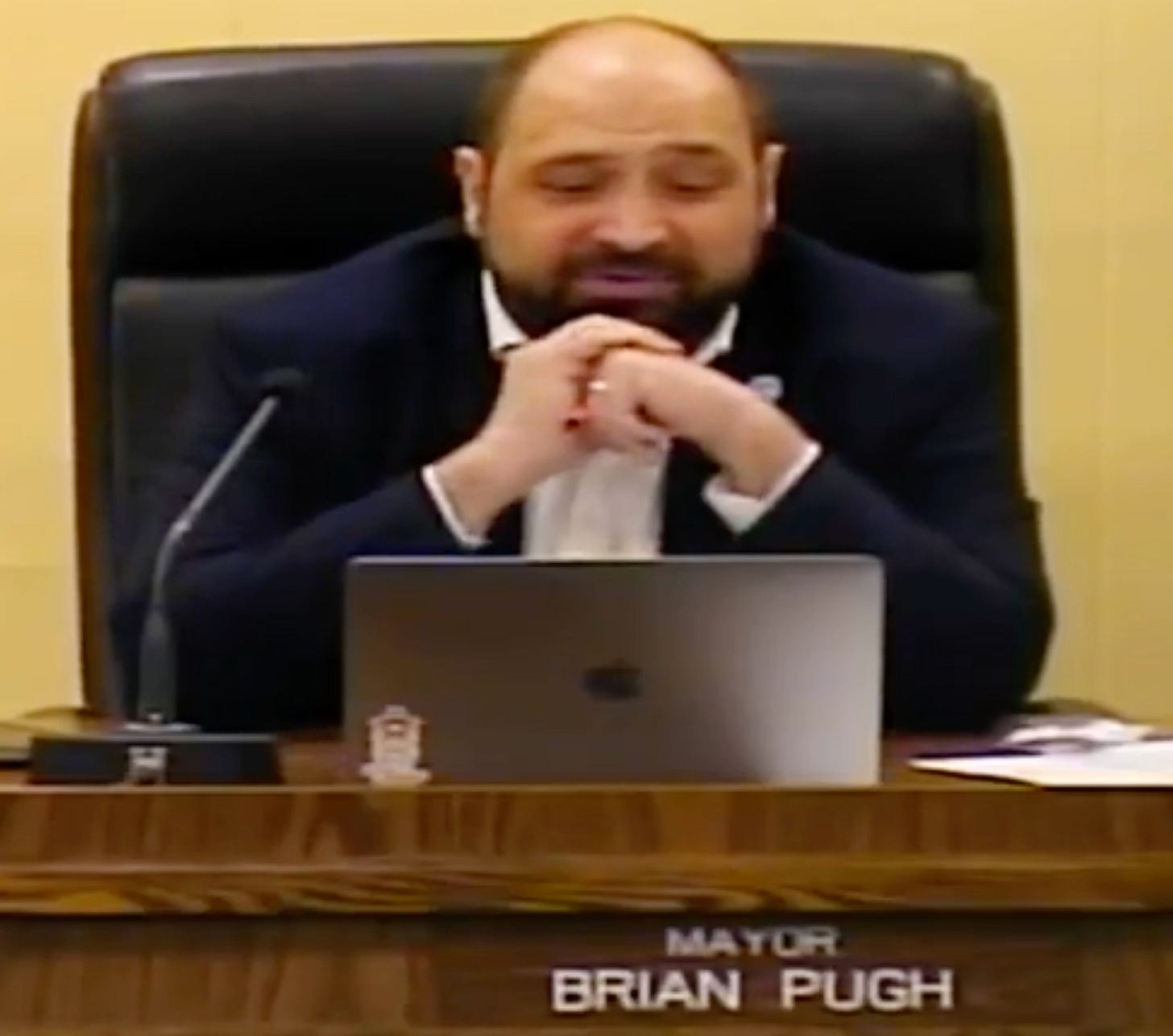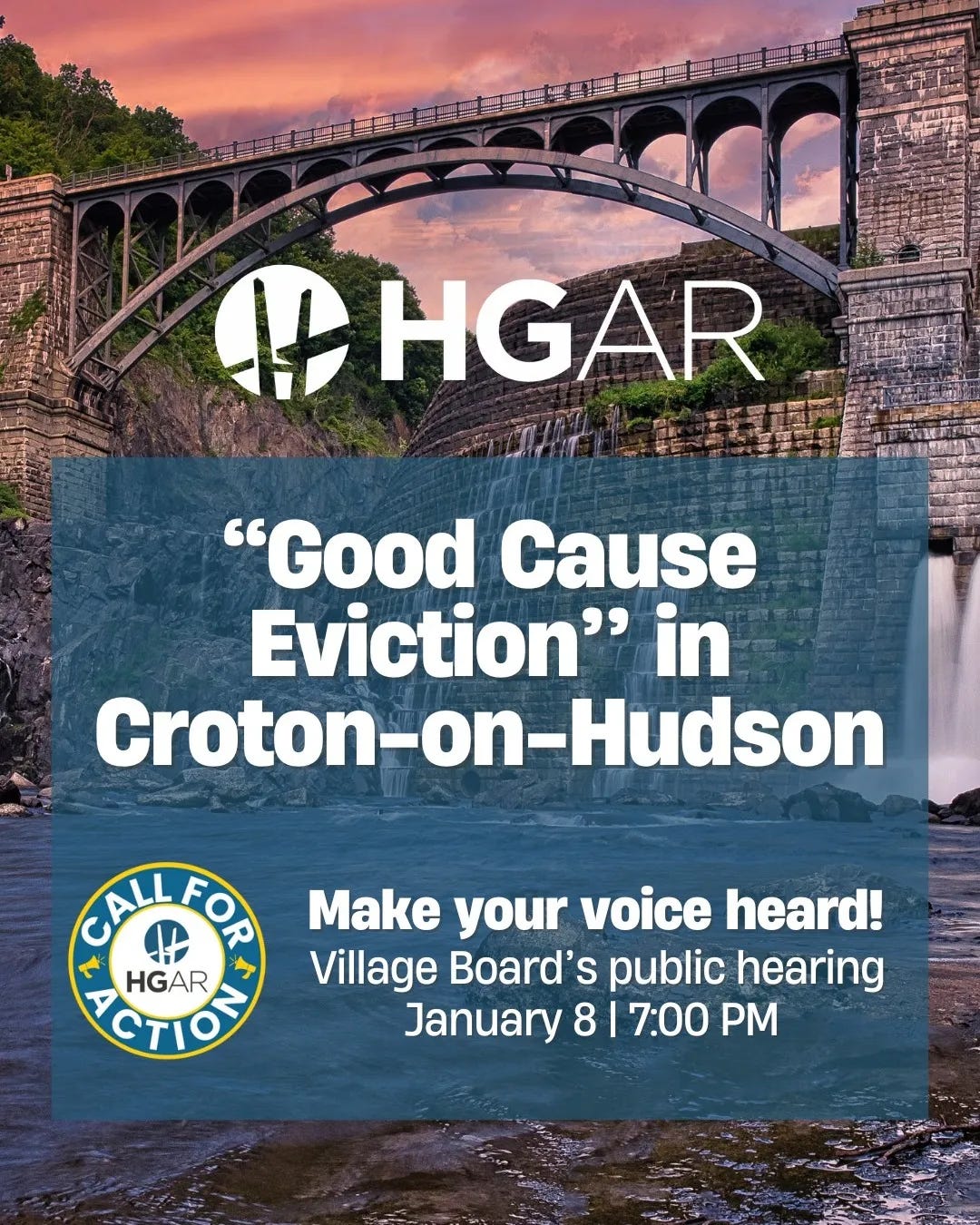Chronicle Editorial: Acting with good cause, Croton Board of Trustees passes Good Cause Eviction Law.
A mass mobilization of realtors to oppose the legislation failed to materialize at last evening's public hearing, while tenants and their advocates were out in force--and made forceful arguments.
Croton mayor Brian Pugh berated realtors who claimed they were not given proper notice about the law and the public hearing.
As an online community newspaper, The Croton Chronicle has a responsibility to bring fair and accurate coverage of issues and events in the village to its readership, giving voice to all sides of debates over Croton’s present and future. In the case of the Good Cause Eviction Law, we have done that in two news reports over the past months, including one earlier this week.
But like most media outlets, the Chronicle also does not hesitate to run editorials or commentaries when we think the facts point clearly in a certain direction (these are in addition to our Guest Editorials, which give villagers of diverse opinions considerable space to express them.)
Last evening, January 8, after a public hearing that had been put on the schedule last November, Croton’s Board of Trustees voted unanimously to pass a Good Cause Eviction Law. The new legislation will give modest protections to the roughly 20% of village residents who are renters.
We say “modest,” because the law, passed by the New York state legislature and signed by Governor Kathy Hochul last April, provides what we think are really minimal protections for renters against unreasonable rent increases and unjust evictions—while leaving landlords with the entire existing legal apparatus intact to raise rents considerably beyond the inflation rate each year and get rid of tenants who do not pay those rents or who engage in illegal or other inappropriate and unacceptable conduct.
Moreover, in a major concession to the real estate industry, the legislation does not apply to rental units occupied after 2009. That means none of the new housing being built or on the planning board in Croton will be subject to the law, and also that many so-called “Mom and Pop” landlords who are renting out older homes or units will not be subject to its provisions either.
Moreover, the law is stuffed with so many exceptions and exemptions for landlords that some tenant advocates have told us it is more useful as a device to open dialogue between landlords and tenants than as a serious protection measure for the latter group. As one example, landlords are allowed to exceed the rent cap provided by the legislation—the rate of inflation plus 5% each year, up to a maximum of 10%—if they can demonstrate that they need to do so in order to provide essential maintenance or upgrades to their property.
Evidence that the legislation will not represent an undue burden to landlords was clear at last evening’s public hearing. While the Hudson Gateway Association of REALTORS (HGAR) had put out a call for a major mobilization at the public hearing, very few of its members showed up. (A few landlords from Croton did speak against the law.)
HGAR Westchester regional director Crystal Hawkins Syska, who had provided some comment earlier this week to the Chronicle explaining HGAR’s opposition to the Good Cause Eviction Law, did come to speak to the Board. She told the trustees that while she is “in favor of more protections for tenants” the new law would create disincentives for landlords to properly maintain and upgrade their properties. Acknowledging that “we do have a housing crisis” in the county and beyond, Syska recommended rental assistance programs, making it easier for tenants to get Section 8 housing, and “mediation sessions” between tenants and landlords in situations where tenants are struggling to pay their rent and stay in their apartments.
All of these may be good ideas, and some of them are already in effect in various ways. But what the real estate industry and some landlords seem to want to avoid are any legally binding protections for tenants, despite clear evidence that rents are skyrocketing in many communities, including in Croton, where they have gone up about 35% over the past five or six years.
Moreover, even though the Good Cause Eviction Law is now in effect in 10 going on 12 New York state municipalities in addition to New York City—and thus we already have a fair bit of experience with the legislation—representatives of the real estate industry and the few landlords present were not able to relate one “horror story” about how the new law has made life more difficult for landlords beyond the basic very mild restrictions they were already facing.
This despite the fact, as trustee Len Simon pointed out during the Board’s discussion of the law after the public hearing was closed, that about 44% of the population of New York state is already living under the provisions of the Good Cause Eviction Law.
Earlier this week, we spoke to Joe Rand, the mayor of Nyack, which was the first village to pass the Good Cause Eviction Law back in September. Unlike Croton, where only about 20% of residents are renters, in Nyack about 70% of the population are tenants. Here is what he told us:
“We had tried to pass the Emergency Tenant Protections Act, but our vacancy survey showed that we didn’t meet the 5% vacancy threshold. But the Good Cause Eviction statute is a reasonable substitute for the ETPA, because it protects against outrageous spikes in rent. We had people coming to our meetings talking about landlords who raised their rent by 25-30% in one year. GCE does protect against that, even though it doesn’t go as far to cap rents as the ETPA might.
How has it been received? Honestly, we had virtually no pushback from the landlord community during the consideration of the GCE, and we’ve not had any substantive negative feedback. I think the landlords recognize that a rental cap of 8-9% gives them a lot of flexibility to adjust to market conditions, so they mostly shrugged their shoulders.”
In other words, there is no evidence that landlords are suffering undue hardships due to this new law. If there had been, we think that the representatives of HGAR and other landlords would have been eager to tell us about them. And despite some “horror stories” we have seen on local social media, the new law changes nothing about what landlords have to do—and can do—to get rid of tenants who do not pay their rent or otherwise give good cause to be evicted. But it does protect against arbitrary actions by landlords, for which there no excuses.
Yet while landlords and realtors did not provide the Croton public hearing with any examples of how the law had negatively affected them, a considerable crowd of tenants and their advocates was present and spoke to their personal experiences as renters. There were stories of struggling to pay ever rising rents and of being evicted due to lost jobs, health setbacks, and other misfortunes, all in the face of ever rising rents. The tenants also talked about the good experiences they had had with Croton landlords, which indicates that they do not consider the new law as part of any kind of class warfare.
At the very end of the public hearing, one shy young woman who had grown up in the Mt. Airy section of Croton asked the Board to pass the law so that she and her friends might be able to stay and live here.
Whether that will be possible even with this new law, which currently will allow annual rent increases of up to 8% and even more if inflation flares up or a landlord can show good cause to raise them, remains to be seen. Obviously it is not a panacea for the housing crisis. But treating tenants with dignity and fairness, and protecting them from arbitrary actions by landlords, is the very least this village can do.
We have been critical in the past of many of the actions and policies of this Board of Trustees, including ones related to housing policy. Last evening, at least, they got it right.
********************************************************************************************************
To share this post, or to share The Croton Chronicle, please click on these links.
Comments policy: No personal attacks of any kind, please be polite and respectful.






It is an encroachment on private property rights. Given the commie board we have, the majority of our electorate suffering from TDS, the continued influx of government-dependent renters, this law with baby teeth today will grow adult razor sharp teeth tomorrow. I am confident this a loose noose around homeowner’s necks that will just keep tightening up until it chokes them out of this village.
For all the comrades who are happy with this outcome:
https://youtu.be/3sh4kz_zhyo
Don’t worry about last time. It’s different when we do it.
(Edit: I’m being sarcastic for those too dense to actually get it.)